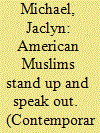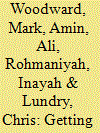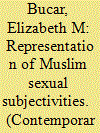|
|
|
Sort Order |
|
|
|
Items / Page
|
|
|
|
|
|
|
| Srl | Item |
| 1 |
ID:
120593


|
|
|
|
|
| Publication |
2013.
|
| Summary/Abstract |
Muslim American stand-up comedy is a unique response to post-9/11 negative social discrimination where socially critical comedians debate the stereotypes and realities of Muslim American life. Thus they continue an American minority tradition of engaging with American social life through public humor. The analysis draws from functionalist theories of the sociology of humor in order to discern the intended social messages of jokes that are meant to entertain and also educate. It shows how Muslim American comedy intends to influence opinions held not only about Muslims but also amongst Muslims. The paper suggests how competing forces related to being Muslim and American undercut the critical public humor of comedians who use these performances to argue what American Muslims should be saying and doing in order to advance their cause for social justice.
|
|
|
|
|
|
|
|
|
|
|
|
|
|
|
|
| 2 |
ID:
120595


|
|
|
|
|
| Publication |
2013.
|
| Summary/Abstract |
Partai Keadilan Sejahtera (PKS, The Justice and Prosperity Party) is the largest Islamist political party in Indonesia. It has roots in the religious and political and religious teachings of the Muslim Brotherhood and promotes what Oliver Roy calls "deculturized religion." The party can be understood as the political component of a larger social movement that seeks to transform Indonesian society and culture in ways that would establish Shari'ah as social, if not political, reality. It is also committed to the electoral process and to working inside the Indonesian political system in a more general sense. Until recently, the PKS has dismissed local modes of Muslim practice and much of Indonesian culture as "un-Islamic." The extent of the party's transformative agenda is unclear for three reasons: it shares the Muslim Brotherhood's gradualist approach, it is less than transparent about its goals, and it is divided into purist or "Justice" and pragmatic or "Prosperity" factions. The leadership of the Prosperity faction is currently ascendant and is attempting to reach beyond its Islamist base by sponsoring musical and dramatic performances it hopes will appeal to Muslims devoted to Javanese and other Indonesian cultural traditions. Ethnographic and web-based research indicate that these efforts are greeted with considerable suspicion.
|
|
|
|
|
|
|
|
|
|
|
|
|
|
|
|
| 3 |
ID:
120597


|
|
|
|
|
| Publication |
2013.
|
| Summary/Abstract |
This paper concerns the level of wellbeing experienced by Swedish Muslim youths and young adults as well as the ways in which this is influenced both positively and negatively by their sense of Islamic religious identity. Taking Akerlof and Crantons' Treatise on "identity economics" as its point of departure, the paper explores, discusses and analyses the following two questions: (1) what are the contexts in which identification with Islam tends to facilitate the wellbeing of Swedish Muslim youths and young adults; and (2) what are the contexts in which identification with Islam tends to destabilize (or increase the sociocultural discomfort of) this same group. Here, the notion of Islam as a "resource" is important, since this underlines its potential to resolve the types of existential dilemmas that are often found to confront the young and undermine their sense of wellbeing. The paper bases its assessments on the results of a questionnaire concerning life, values, relations, leisure time activities and religion that was distributed to a total of 4,000 young Swedes, a certain number of whom identified themselves as "Muslims". Apart from studying the survey's Muslim-specific results, I have conducted a number of additional interviews with young Muslim respondents, aiming to extend our understanding beyond the strictly quantitative findings of the material. The survey indicates that, much like their Christian counterparts, a majority of the Muslim respondents considered their belief in Islam to be a private, personal matter; one-third described themselves as "seekers"-an identification that previous research has found to be associated primarily with secular majority youth. The results further indicate that a majority of Muslim youths have a low level of confidence in religious leaders and that very few are actively involved in mosque activities and the like; on the contrary, they prefer to spend their leisure hours earning money, being with friends and/or "working out" at the gym. While the survey found that the vast majority of Muslim respondents looked upon the social and spiritual dimensions of Islam as a positive resource, the interviews indicate that the ability of young Muslims to appropriately shift between different forms of cultural belonging is highly advantageous as well.
|
|
|
|
|
|
|
|
|
|
|
|
|
|
|
|
| 4 |
ID:
120594


|
|
|
|
|
| Publication |
2013.
|
| Summary/Abstract |
On March 8, 2008, PAS led the coalition to victory in Kedah, winning 16 seats, while Barisan National won only 14 state seats. This paper highlights cultural dimensions of the shift from BN to the opposition coalition in this state of the Malay heartland. The PAS manifesto and campaign speeches in Kedah emphasized Islamic ethics, a just, clean, and pure government which would strive to improve the conditions of all the people. These notions of a "just" and "unmixed" party struggling to "strengthen Islam" resonated with many Malays in Kedah. In contrast, UMNO was depicted as corrupt practitioners of bribes and money politics who prioritize the interests of the rich over the needy. They were criticized as materialist, elitist figures stuck in their ways like the Pharaoh, while PAS' commitment to upholding Islam was likened to the prophets. In addition, this paper discusses the way PAS approaches the issue of the "social contract" between Malays and other ethnic groups and the way their construct of Malay identity spoke to many Malay voters. I argue that PAS rhetoric must be viewed as more than political use of Islamic symbols, and that its effectiveness rests in the way it evokes more extensive cultural models. Finally, this paper considers the controversial post-election demolition of a pig slaughterhouse in a predominantly Malay kampong in Kota Setar, Kedah. Here I argue that this case embodies and reaffirms the cultural politics of the general election.
|
|
|
|
|
|
|
|
|
|
|
|
|
|
|
|
| 5 |
ID:
120596


|
|
|
|
|
| Publication |
2013.
|
| Summary/Abstract |
In 2005, following a year of increased attention in English language media to the prominence of sexual reassignment surgeries in Iran, the London-based Guardian dubs Tehran "the unlikely sex-change capital of the world." This title is significantly complicated when we realize that according to mainstream English media, Tehran is not the first or only sex change capital of the world. Its sister city is Trinidad, Colorado, a predominantly Catholic town with a population hovering around 9,000. Although English language newspapers have served up stories of each location as "surprising" magnets for SRS, none have mentioned both places in the same article because these stories operate with a different set of logics related to religion, sex, and human rights. Analysis of the journalist rhetoric of these two unlikely capitals highlights these diverse logics, particularly how assumptions about Muslim subjectivity affects judgments about the status of sexual freedom in Iran.
|
|
|
|
|
|
|
|
|
|
|
|
|
|
|
|
|
|
|
|
|